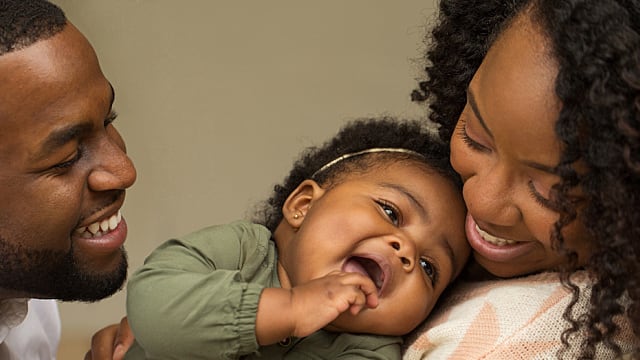What Are Teeth Wipes?
Teeth wipes are small, saturated, gauze-like pads formulated to help prevent tooth decay. The textbook Dental Caries: Diagnosis, Prevention and Management explains that these wipes are one method of applying antimicrobial agents in the mouth to reduce the amount of harmful oral bacteria, such as Streptococcus mutans. Ultimately, the goal of using these wipes is to reduce your baby's risk of early childhood cavities.
How Do They Work?
There are many varieties of teeth wipes on the market, but they all typically work in the same way. You simply wrap the wipe around a clean finger and rub it along your baby’s gums, teeth, inner cheeks and tongue. You can normally use them on newborn babies to clean their mouths and get them started with oral hygiene, or on older babies with teeth who don’t respond well to toothbrushing. However, it’s a good idea to check the age recommendations on any specific product you choose.
Baby dental wipes are typically saturated with a xylitol solution. The American Academy of Pediatric Dentistry (AAPD) describes xylitol as a five-carbon sugar alcohol that is not easily processed by cavity-causing bacteria. So while your baby will find the sweet taste pleasant, the xylitol won’t increase their risk of tooth decay like real sugar would.
Proven Protection: The Effectiveness of Dental Wipes for Infants
Although the AAPD reports that there is a need for further research on the efficacy of xylitol in preventing cavities, it ultimately supports the use of the ingredient.
When it comes to xylitol wipes, some studies have found positive outcomes from using them. For example, a study published in the International Journal of Clinical Pediatric Dentistry (IJCPD) showed a clinically significant decrease in cavity-causing bacteria in a group of children ages 19 to 35 months old whose parents used xylitol teeth wipes to clean their teeth and gums.
The protocol in the IJCPD study was to wipe the child's teeth and gums twice a day with the xylitol wipes. If you do choose to use baby teeth wipes, you should follow the instructions on the product packaging closely or consult your dentist.
Dental Wipes and Infant Safety
The AAPD says that xylitol is safe for human consumption. That means if your baby does ingest any of the xylitol from the wipes, they are very unlikely to experience any side effects. However, if you do notice that your baby has an upset stomach or any irritation in the mouth after using xylitol dental wipes, stop using them and contact your pediatrician for advice.
Babies love to put things in their mouths! And because of the sweet taste of baby dental wipes, they may find them extra irresistible. Never allow your baby to hold on to the wipes themselves as they could present a choking or suffocation risk. Dispose of baby dental wipes immediately after use and be sure to store them out of reach of babies, children and pets.
Mastering Dental Wipe Techniques: Tips for Effective Use
Cleaning your baby’s mouth with dental wipes couldn’t be simpler! Just follow these tips:
- Wash your hands.
- Take a clean dental wipe and wrap it around your index finger.
- Gently rub the wipe along all surfaces of your baby’s gums.
- Wipe the inside of the cheeks, the space between the lips and gums, and the surface of the tongue.
- If your baby has teeth, wipe all surfaces of each tooth.
- That’s it! No need to rinse with water.
- Dispose of the wipe immediately and store the package away from children and pets.
Essential Infant Oral Care Tips
If you’re looking for ways to prevent tooth decay in your child, wipes may be a good boost to your home care routine for your baby's teeth and gums. That said, always consult your dentist before trying new dental products for yourself or your child.
The American Dental Association advises parents to follow these home care steps to maintain your child's oral health:
- Take your child for their first dental checkup after their first tooth erupts or before they turn one — whichever occurs first.
- Start cleaning your baby's mouth within the first few days after birth by wiping their gums with dental wipes or a clean cloth or gauze.
- Once teeth erupt, you can start to use a toothbrush and fluoride toothpaste. However, be sure to use no more than a smear (no bigger than a grain of rice) of toothpaste.
If you're considering adding dental wipes to your baby’s oral hygiene routine, speak to your dentist to see if they’re a good fit for your child.
Oral Care Center articles are reviewed by an oral health medical professional. This information is for educational purposes only. This content is not intended to be a substitute for professional medical advice, diagnosis or treatment. Always seek the advice of your dentist, physician or other qualified healthcare provider.
ORAL HEALTH QUIZ
What's behind your smile?
Take our Oral Health assessment to get the most from your oral care routine
ORAL HEALTH QUIZ
What's behind your smile?
Take our Oral Health assessment to get the most from your oral care routine
Join Us
Get the best of your oral health routine and take it to the next level with expert advice, recommendations, products and solutions and special offers.
Join Us
Get the best of your oral health routine and take it to the next level with expert advice, recommendations, products and solutions and special offers.















